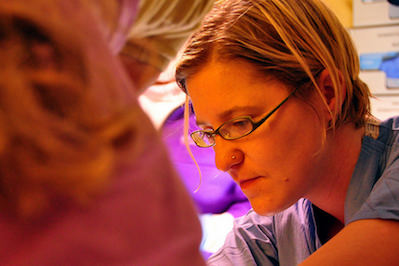Rapid Burnout, Dissatisfaction of U.S. Doctors Threatens Public Health Crisis
Half of U.S. physicians are “disengaged, burned out, and demoralized and plan to either retire, cut back on work hours, or seek non-clinical roles,” according to a new survey.Half of physicians nationwide are “disengaged, burned out, and demoralized and plan to either retire, cut back on work hours, or seek non-clinical roles,” according to a new survey.
Half of U.S. physicians are “disengaged, burned out, and demoralized and plan to either retire, cut back on work hours, or seek non-clinical roles,” reports MedPage Today, citing a new nationwide survey commissioned by The Physicians Foundation.
“Many physicians are dissatisfied with the current state of the medical practice environment and they are opting out of traditional patient care roles,” said Walker Ray, MD, president of The Physicians Foundation, in remarks that appeared with the survey.
“The implications of evolving physician practice patterns for both patient access and the implementation of healthcare reform are profound.”
MedPage Today reports:
The majority of the 17,236 physicians surveyed (54%) describe their morale as somewhat or very negative, 63% are pessimistic about the future of the medical profession, 49% always or often experience feelings of burn-out, and 49% would not recommend medicine as a career to their children, according to the survey.
Physicians identified regulatory/paperwork burdens and loss of clinical autonomy as their primary sources of dissatisfaction. They spend 21% of their time on non-clinical paper work duties, according to the survey, while only 14% said they have the time they need to provide the highest standards of care. About two-thirds (72%) said third-party intrusions detract from the quality of care. …
The survey indicates that only 33% of physicians now identify as private practice owners, down from 49% in 2012, while 58% identify as employees, up from 44% in 2012.
Physicians also indicated that “they’re disengaged from key initiatives of healthcare reform,” MedPage Today reports.
Only 43% said their compensation is tied to value. Of these, the majority (77%) have 20% or less of their compensation tied to value. Only 20% are familiar with the Medicare Access and CHIP Reauthorization Act (MACRA) which will greatly accelerate value-based payments to physicians.
While 36% of physicians participate in accountable care organizations (ACOs), only 11% believe ACOs are likely to enhance quality while decreasing costs. Physicians also are dubious about hospital employment of doctors, another mechanism for achieving healthcare reform.
Two-thirds (66%) do not believe hospital employment will enhance quality of care or decrease costs. Even 50% of physicians who are themselves employed by hospitals, do not see hospital employment as a positive trend.
The survey additionally found:
* 80% of physicians are overextended or are at capacity, with no time to see additional patients * 48% of physicians said their time with patients is always or often limited * Employed physicians see 19% fewer patients than practice owners * 46.8% of physicians plan to accelerate their retirement plans * 20% of physicians practice in groups of 101 doctors or more, up from 12% in 2012 * Only 17% of physicians are in solo practice, down from 25% in 2012 * 27% of physicians do not see Medicare patients, or limit the number they see * 36% of physicians do not see Medicaid patients, or limit the number they see
One Truthdig reader said of the findings:
One should compare what’s happened in the medical profession with what’s happened in the nation’s universities — greed and ideologically driven (rather than empirically based) business modeling turned control of persons educated to perform the profession’s real work over to hordes of bean counting ‘administrators’ whose policies and actions deprive doctors and professors of autonomy, reduce both time to perform and fair reward for their work, and slash due respect for their hard acquired skills and the developed judgment needed to effectively use them with patients and students.
These results follow from privatization, which is a form of theft consisting of the capitalist practice of plundering employees and reducing services to the public in order to leach wealth for owners, managers or both — workers, humanity and Earth’s future be damned.
Update:
Via email, Truthdig reader Lawrence Raines, recently retired from a career in health care, adds to the findings and the preceding comment:
I was an independent General Surgeon who retired (after 31 years in same location) in August 2013 because of the relentless, oppressive intrusion of Corporatised Medicine which is nicely described by the above quote from one of your readers. There are myriad reasons that led to my retirement but using my long acquired and honed skills to care for my patients was not one of them. I loved being a doctor but my professional life was literally sucked out of me and according to the article and conversations with former colleagues it has continued to get worse, “much worse.” I don’t think this is unique to healthcare and I have grave concerns about what type of society will exist for my grandchildren. Greed and Power and the associated Immorality are corrupting the world.
—Posted by Alexander Reed Kelly
Independent journalism is under threat and overshadowed by heavily funded mainstream media.
You can help level the playing field. Become a member.
Your tax-deductible contribution keeps us digging beneath the headlines to give you thought-provoking, investigative reporting and analysis that unearths what's really happening- without compromise.
Give today to support our courageous, independent journalists.






You need to be a supporter to comment.
There are currently no responses to this article.
Be the first to respond.